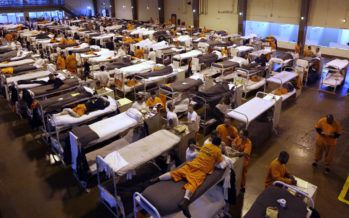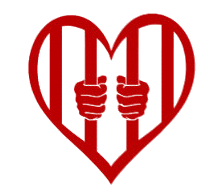 This is the second article
in a three-part series on mass incarceration and the Church. Previously, we discussed how a variety
of discriminatory factors converge to put millions of people behind bars, a
disproportionate number of whom are our black and brown citizens. Here, we
examine one organization’s attempt to bring redemption to a broken system.
This is the second article
in a three-part series on mass incarceration and the Church. Previously, we discussed how a variety
of discriminatory factors converge to put millions of people behind bars, a
disproportionate number of whom are our black and brown citizens. Here, we
examine one organization’s attempt to bring redemption to a broken system.
Prison
can feel like a forgotten place. A place where we send our broken and unwanted
to hide them away from the nation’s consciousness. For so many, it is a place
of trauma, of retribution, that only adds to a lifetime of hurt. But what if
instead, prisons were a place of redemption, a place of hope? What if prison
became a beacon of God’s love, not just to those living there, but to the
world?
These
are some of the questions that the Horizon Prison Initiative tries to answer.
Horizon
grew out of the Kairos Prison Ministry when several leaders saw the
opportunity to expand beyond a brief three-day encounter into a more in-depth program
that could build lasting relationships to truly transform lives. They found
that “removing your inner scarring and resentments toward yourself and others
is not a simple process; it is achieved in a 24/7 year-long living, learning,
and loving environment.”
After
an initial launch in Florida, Chief Operating Officer Jeff Hunsaker says the program expanded to Ohio when a compassionate
warden saw the importance of faith communities within prison walls. Horizon
aimed to do what the prison institution couldn’t—to love on prisoners with
God’s love in a profoundly transformative way. Hunsaker observes “you can’t pay
people to care about people.” It has to come freely, and from the heart.
Horizon’s
mission is to “transform prisoners to embrace society, not harm it. These
transformed prisoners then transform prison cultures. Then they transform home
communities.” Horizon graduates are told “you are a living example of faith,
love, and respect. As a graduate your message of spiritual development and
personal growth will impact prison culture. You will make light out of darkness
and bring hope where little is expected.”
In
explaining how he came to lead such a unique and sometimes trying endeavor
Hunsaker said “It’s about calling. You have to be called to do this work. I
could not resist it.”
| Jeff Hunsaker |
The Horizon Program
The
structure of the Horizon Program gives participants the opportunity to live out
the lessons they are learning as they experience their transformation. As a sort
of monastic community, participants are grouped into family units that meet
regularly together. “That family part is critical” says Hunsaker. It helps the
participants learn to live together, encouraging each other and resolving
conflicts as a functional family, even if this hasn’t been their experience
with their families outside of the prison.
Though
Horizon participants are required to maintain their normal work schedules and
prison life during the day, evenings are spent with other participants in a
variety of Horizon programing. There are eight core components that are
mandatory elements of the program:
1. Awakenings: Enhancing
Spiritual Wholeness. Awakenings helps participants find meaning from their experiences,
confronting thoughts and habits that contribute to current beliefs and
behavior.
2. Building Community helps participants learn to
resolve conflicts in constructive and meaningful ways and to gain “faith
solutions to life’s trials and conflicts.”
3. Character Reformation is a time set aside to
address how one’s thoughts and attitudes can themselves perpetuate negative circumstances
and interactions.
4. Daily Family Meetings contribute to participants’
sense of belonging and help foster abiding relationships within family groups.
5. Faith Fundamentals shore up the foundations
of participants’ spiritual beliefs and offers the building blocks for a
committed faith.
6. Outside Brothers meet with participants to
connect them with the outside community in solid, caring one-on-one relationships.
7. The Trauma/Healing
Awareness Workshop allows participants to examine how trauma has affected their lives, and
about breaking the trauma cycle.
8. Victim Awareness gives participants the opportunity to reflect on
the effects of various crimes on victims, their families, and their
communities.
Each
program element provides an essential component of Horizon’s success, and participants
can also create their own activities and electives. Hunsaker notes his
particular gratitude for the Outside Brothers who work closely with each
participant. He says that they “bring the grace of God,” entering into
conversation with no agenda, but listening and loving unconditionally. They bring
hope, helping the men realize “I’m not this piece of dirt that people are
saying I am.”
Participants
also have the opportunity to join in the Family Letter Writing program, which
provides them each with two stamps and two envelopes per week. After weeks of
exchanging letters with individuals back home, relationships can begin to be
healed and families can be restored.
Graduates
of the Horizon Program can return in subsequent years as Encouragers. Each
family unit is assigned an Encourager who guides the group through the program,
helping to resolve conflicts and to serve as a mentor to the men as they
progress.
One
of the Encouragers, known as Coach, attests “I love what I do. It’s about
inmates helping inmates to change their lives. Who’d have thought I’d have the opportunity
to go to prison and change lives?”
Transformative Community
As
a result of Horizon’s work, lives are changed both inside and out of prison
walls. The Horizon Program realizes that “prisons don’t successfully transform
lives. Prisoners do.” It is sometimes the first encounter with the deep love of
God for men who have never had anyone care about them.
Thus,
faith plays a central role in the Horizon curriculum:
“Faith is a critical ingredient in Horizon’s
transformation process. Horizon is not a place for quick, short-term, and
for-show jailhouse displays of religiosity. The faith experience is real and
deep with meaning – one that uncovers truth, gives purpose to those who thought
they had none, and reinforces the changes they so desperately want to
make. It provides a way for atonement
and forgiveness—of self and others. It invigorates people from the outside to
volunteer and places of worship to become reentry lifelines. It gives hope
where hope is not expected.”
Horizon
also focuses on trauma recovery, knowing that “trauma not transformed is trauma
transferred.”
| Jimmy Cheadle |
Those
on the inside note that “just coming to prison is trauma itself.” There is a
victim offender cycle in which those in prison were often first victims themselves
before becoming perpetrators. Horizon helps them recognize this cycle, and to forgive.
Jimmy
Cheadle is a Horizon graduate, and served as an Encourager on the inside. He
now works as an Urban Encourager and Reentry Coordinator with UMChurch for All People in Columbus, OH, offering support and programing for recently released
citizens. He explains “Horizons changes a few people at a time, letting them go
back into the rest of the population to change the culture of the prison. But
changing the culture takes a long time.”
That’s
why Hunsaker says he actually sometimes prefers to enroll men serving life sentences.
They have the opportunity to have the greatest long-term impact on prison
culture. There are men who have graduated the program that are “far more effective inside than they would be on the street.” Thus, he note that “all
things work together for good for those who love God, who are called according
to his purpose” (Romans 8:28), even inside prison walls.
Horizons
volunteer Sue Wolfe acknowledges that much of the transformative power of the
program comes from the men themselves: “we recognize that we’re with them for a
few hours a week in a long week.” The men are doing their own work of “reclaiming
their own humanity, to learn they are also a person of worth.”
Wolfe
notes that “too often prisons are about retribution, not restitution, but that
Horizon can “restore who God created us to be.” She has interacted with many
men in the prison who “had thought they were not smart, who were told they
aren’t, but now are learning so many things…it changes who they perceive themselves
to be.”
Not a One-Way Street
Horizon
has become part of the volunteers’ spiritual journey as well. “The volunteers
will tell you they receive more than they give,” says Hunsaker. And indeed, the
testimony of those visiting the prison attests to this. “I’m braver than I
thought I was” Wolfe notes about her interactions and experiences, “I didn’t
think I could do that.”
| Men in the Horizons program |
Susan
McGarvey, also a volunteer with the Horizon Initiative shared that she “always
lived and worked in communities similar to me. Certainly my world view has
broadened immensely.” She goes on to explain “it makes us realize we are more
alike than we are different. We sit down at table with each other week after
week and find out that they are flawed human beings just like I am.”
The
Horizon program provides an important step for volunteers to live into the
faith they profess. McGarvey expounds “it’s a real opportunity to find out if
the things you’ve been saying your whole life are really true: grace , mercy,
forgiveness, loving the unlovable.” She has had a tremendous impact on the
lives of men, and the men on her.
McGarvey
notes that she also came to realize how similar we all are, that we all do “foolish
things could have turned out differently. Hunsaker agrees, “we’re all part of
the great uncaught.”
When
Dale, one of the Horizon Encouragers went before his parole board they asked
him what benefited him the most while in prison, “Head and shoulders above, the
answer was Horizon.”
With
a recidivism rate that is five times lower than average, Horizon graduates make
good use of the tools provided to them in the program. With government budgets
becoming ever tighter, the program notes that “for every 10 Horizon
participants that get out of prison and stay out, the state stands to save
$260,000 per year, for every year they stay out!”
This
makes the $1,600/person yearly cost of the program more than worthwhile, with
the “return on that investment being in significant reduction in recidivism,”
explains McGarvey. In the face of bloated prisons and broken legal systems, more
programs like Horizon are needed to let the Light of God shine in dark places.
Having looked at the effect
that God’s transformative love can have inside prison walls, we will nextexamine what local churches can do for those who have been recently released
and are looking to rejoin our communities. If you would like to learn more
about the Horizon Prison Initiative, or to support their work, visit: http://HorizonPrisonInitiative.org/
The above article originally appeared at Urban Faith.


No comments:
Post a Comment